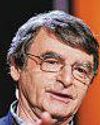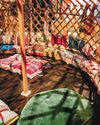
Looking down as the Emirates airline's Boeing 777 approaches Dubai's international airport, you can see you're in a desert. The view is all brown sand, with a few shrubs and the occasional low-rise settlement. But as you get lower and closer to the city, you see neat rectangles and circles of green - obviously all man-made, dotted with date palms, and then, towering skyscrapers in the distance. The desert has disappeared.
You clear immigration and customs quickly - the airport is efficient and drive through broad highways into the city, past chic modern buildings, stores and malls.
Until oil was discovered in the late 1960s, Dubai - the most populous of the seven emirates that make up the United Arab Emirates (UAE) - was a backwater, dependent on activities such as pearl diving, date farming and fishing. But after the oil boom of the 1970s, it invested heavily in infrastructure, real estate, social amenities and tourism facilities.
It now boasts some of the world's tallest buildings, including the tallest of them all - the 828m, 163-storey Burj Khalifa, shaped like a rocket ship. Next door is the Dubai Mall, the world's biggest, with attractions that include an Olympic-sized ice-skating rink, an underwater aquarium and a virtual reality theme park. Dubai also has the world's biggest port operator DP World, which manages more than 90 terminals in 40 countries. It organised the 2024 Gulf International Technology Exhibition, which ran from Oct 13 to 17 and was billed "The Biggest AI Show on the Planet". Dubai is a great believer in "big".
OIL-DEPENDENT NO MORE
After the development and modernisation of the past 50 years, oil is no longer the mainstay of Dubai's economy, accounting for barely 1 per cent of its GDP and less than 5 per cent of government revenue. What has taken its place are clusters of activities around trade, tourism, real estate and financial and business services.
Denne historien er fra October 24, 2024-utgaven av The Straits Times.
Start din 7-dagers gratis prøveperiode på Magzter GOLD for å få tilgang til tusenvis av utvalgte premiumhistorier og 9000+ magasiner og aviser.
Allerede abonnent ? Logg på
Denne historien er fra October 24, 2024-utgaven av The Straits Times.
Start din 7-dagers gratis prøveperiode på Magzter GOLD for å få tilgang til tusenvis av utvalgte premiumhistorier og 9000+ magasiner og aviser.
Allerede abonnent? Logg på

British novelist David Lodge was twice shortlisted for Booker Prize
British novelist David Lodge, who was shortlisted for the Booker Prize twice, has died at the age of 89, his publisher said on Jan 3.

A CITY FOR BABIES
After a successful experiment, The City of Babies Lab has opened a new permanent space dedicated to children aged from birth to 23 months.

Scientist Names 16 New Spider Species After Jay Chou's Songs
A Chinese scientist has named 16 new spider species after songs by popular Mandopop musician Jay Chou.

Actress JJ Jia Xiaochen upset with hubby for not remembering wedding anniversary
Chinese actress JJ Jia Xiaochen has grumbled about her husband, Hong Kong action star Louis Fan, on social media again.

Actress Chen Liping leaves Mediacorp after 40 years
Actress Chen Liping, a household name in the local entertainment industry, has left broadcaster Mediacorp after 40 years.

Raising four cats costly, but gives Rui En four times the joy
In this new series, The Straits Times speaks to pet-owning personalities about the trials and delights of raising their fur kids

Vet Talk Check that your pet is eating safely during the festive season
Pet ownership is on the rise in Singapore, with many families treating their furry companions as one of their own.

Learning to embrace change positively
On the last evening of our recent family holiday, my three children were having a boisterous conversation in the bedroom of the apartment we were staying in.

STRONGER, TOGETHER
Good parent-teacher relationships can boost a child's confidence and holistic development

Roaring Off To A-League Adventure
Tan makes Brisbane debut as sub in loss to Canberra on her return from knee surgery